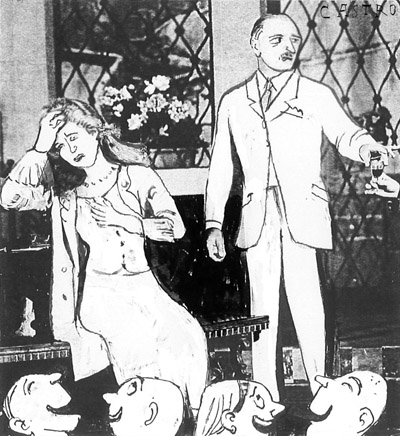For obvious reasons, people are always looking for a nicer word for right-wing. For a while, they tried ‘free-market’ — after all, it sounds spirited and buccaneering — but the 2008 financial crisis left that one holed below the waterline. There was a brief fashion for trying to make the word ‘laissez-faire’ sound attractive, but it succumbed to the same lethal question Raymond Williams once asked of the permissive society. ‘Oh yes? And, tell me, who exactly is meant to be doing the permitting?’ After that, the right tried vainly to appropriate the word ‘radical’ and make it work for their side. All wingnut think-tanks and rich men’s lobby groups, when coming up with ingenious wheezes to make the poor suffer even more, were suddenly styled ‘radical’. Andrew Lansley always called his proposals to axe hospitals ‘radical’. But now we’re groaning under this Mickey Mouse usage ‘libertarian’. It’s meaningless. Michael Gove wants centrally to dictate the curriculum in schools, to ban BBC television plays he doesn’t like, and has let out not one squeak of protest against the Home Secretary’s plans to read all our private emails. Liam Fox, in disgrace, wants to subjugate what remains of our independent foreign policy to that of the Americans, and then set forth to bomb Iran. Libertarian? I think not. There are one or two genuine libertarians — David Davis, yes — but otherwise you are right to lock away the china whenever you hear the word. It’s replaced ‘the devil is in the detail’ as Britain’s most annoying political cliché. It’ll be gone in a year or two.
The received wisdom is that styles in acting change. Everywhere it’s said that if our generation saw David Garrick, we’d be embarrassed. Sarah Bernhardt, Eleonora Duse and Isadora Duncan would all be ridiculous. Well, actually, it turns out that it isn’t necessarily true. Right now, I recommend you go to YouTube and access a filmed recording of the Laurence Olivier production of Uncle Vanya which helped open the Chichester Festival Theatre in 1962. I watched it again from beginning to end. Michael Redgrave gives a performance as Vanya which would be acclaimed as perfect were you to see it on stage tonight. No adjustment is necessary. So much for the argument that theatre’s all a matter of fashion and memory. At last we have the technology to check our personal powers of recall, and Joan Plowright and Redgrave both hold up magnificently. What’s more, Olivier, in his own performance, predates another contemporary prejudice: that just because Astrov’s an environmentalist who cares about forests, he must be a saint. Olivier plays him the other way — calculating, devious, untrustworthy with women — sorry, everyone, but not so different from Chekhov himself.
Poetry’s a strange line of work. You’ve only got to come up with one perfect line — ‘They flee from me that sometime did me seek’, ‘Daddy, I have had to kill you’, ‘I’m in Paris with you’ — and your name will be known for the next few hundred years. It’s the purest form of literary roulette. Nobody cares what else you wrote, just that one line: ‘I will arise and go now, and go to Innisfree’, ‘I sit in one of the dives on Fifty-second street’, ‘Not waving but drowning’. This year Faber took another optimistic spin of the wheel by getting Carol Ann Duffy to commission a new poem for each of the 60 years of the Queen’s reign. Liz Lochhead, superbly feminist, provides one of Jubilee Lines’ two best poems. In my admittedly biased view, Alan Jenkins offers the other. ‘Between’ celebrates the fact that the poet’s current squeeze was born in 1978 — between when the poet first saw a play of mine, Plenty, and a play of Pinter’s, Betrayal. How great if the beautiful phrase about Kate Nelligan’s ‘black waisted plunge-line dress’ were one of the ones that caught on.
Signs of growing old. First, a preference for local newspapers. I’d far rather read the Camden New Journal than the Economist (a magazine which, mind you, must be as tedious to write as it is to read. Is the solution to every country’s problems really to resemble the US more closely? Can’t anyone at the Economist come up with a new article?). Second, choosing to ride on buses, especially upstairs. Is anything more interesting than looking in people’s first-floor windows? Third, matinees. A good play can seem even better in the afternoon. However, a year or two ago, during a matinee of The Smoking Diaries, at which the average age seemed to be about 85, the supposedly tragic scene in which Simon Gray is told by his doctor that he has only 12 months to live rather lost its intended shock when you could feel the whole audience respond with a collective ‘Hmm? Twelve months, not too bad, I’d settle for that.’ Fourth, and the clincher: admiring youth unreservedly.





Comments